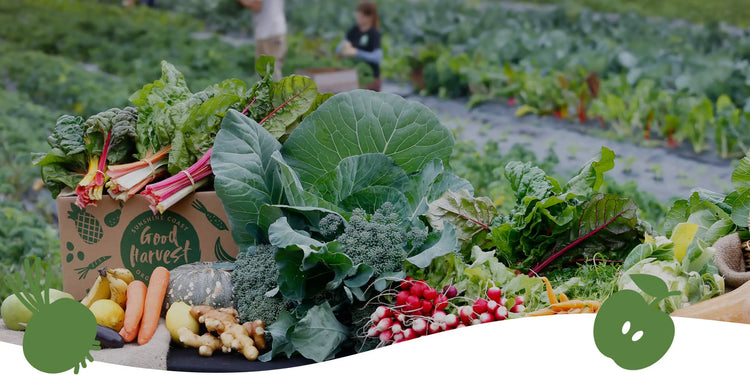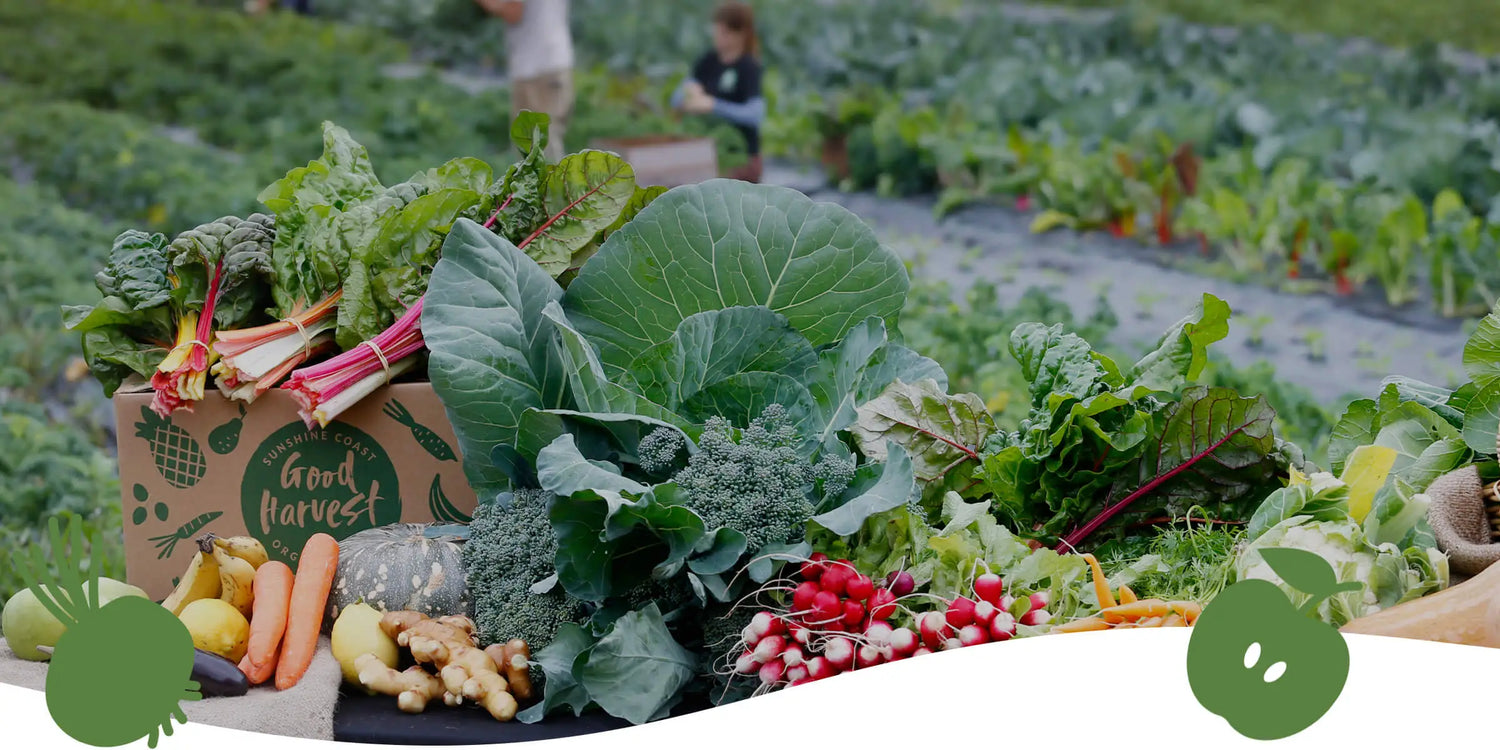
A-Z Produce Storage Guide
Tips & tricks on how best to store your produce from our farm to your family
Storing fruits
Apples 🍎
Definitely best in the fridge! Both red apples and green apples will stay fresher for longer if kept cool.
Bananas 🍌
Ripen in the fruit bowl on the bench, keep in mind that bananas will ripen quickly if it is warm and sunny. Freeze in little pieces for later use in smoothies and for ice cream treats.
Berries 🍓
Organic berries are not treated with any post harvest chemicals which means they will need to be eaten soooner than their conventional counterparts. We suggest storing strawberries and blueberries in a glass jar in the fridge and eat within a few days.
Citrus 🍊
Best kept in the fridge! All citrus including oranges, mandarins, lemons, and limes should be kept cold. The idea of a fruit bowl full of oranges on the table works well for cool weather climates, but for us, even in winter it is best to keep citrus in the fridge to help retain it's juiciness and firm skin.
Pears 🍐
Pears are best kept in the fridge in the crisper drawer (next to the apples).
Stone Fruit 🍑
The term stone fruit includes peaches, nectarines, plums, and even cherries. Keep them in the fridge for maximum freshness! If your fruit still needs to ripen, you can set it on the benchtop in a single layer for a day or two before eating. This will also help you get the maximum flavour! Stone fruit generally last in the fridge for up to 5 days.
Storing vegetables
Avocado 🥑
Typically avocados arrive to us the day after being picked so can take up to a week or ten days to ripen, keep them in the fruit bowl next to the bananas. When cut, store halves wrapped in a wax wrap in the fridge. Can be made into guacamole and frozen or my favourite - avocado chocolate mousse stored in the freezer!
Beans
Store beans in the fridge in the crisper, either in the compostable green bags (these bags can be re-used many times!), or in a mesh produce bag - you want to avoid them drying out in the fridge hence the bag/wrap.
Beetroot
Beetroot will dry out quickly in the fridge if not wrapped or bagged, although can be revived by soaking in water and then draining and using.
Broccoli 🥦
My favourite veggie so it never lasts long in my house! The best thing to do with broccoli is keep it in a compostable green bag or wrap in a damp towel in the crisper. Even the freshest broccoli will look sad if exposed to dry air for too long.
Cabbages
What I love about cabbage is that the many layers of outer leaves act as a good preservation tool for the inner leaves. Store in the fridge in a compostable bag or wrapped in a damp cloth, but you can also easily cut off the brown/wilted outer leaves or ends and the rest of the cabbage would be fresh and crisp.
Capsicum
Keep in the fridge in the criper, once cut, wrap remaining capsicum in a waxed wrap or store in a glass container in the fridge.
Carrots 🥕
Wrap carrots in a damp towel in the crisper or store in reusable produce bags to help avoid these drying out.
Cauliflower
The outer leaves of the cauliflower are natures way of keeping the cauliflower head fresh! Best kept in a re-useable produce bag, compostable bag or wrapped in a damp towel, keep the outer leaves on as. long as you can even after cutting off what you need from the head.
Celery
How frustrating is limp floppy celery :( Keep this in the fridge wrapped in a damp towel, or cut and store in a glass jar with water.
Corn 🌽
Corn husks are natures beautiful way of keeping corn fresh. The beauty of these is that the husks can look dry and old but the corn inside is still fresh! Yay! Store corn in the fridge - also corn husks can be great to use as a warp for other produce too.
Cucumber 🥒
Avoid cucumbers drying out in the crisper by storing in a cloth wrap or compostable /re-useable bag.
Eggplant 🍆
In the crisper for eggplant, you can wrap them or store in a bag to reduce dryness on the skin.
Garlic 🧄
Store garlic in the pantry in a dark, cool, dry place
Ginger
Young ginger with soft skin should be stored in the fridge and used within a week, mature ginger with firm skin can be stored in the pantry in a cool dark place. You can also freeze ginger either in cut pieces or whole and use straight from the freezer.
Herbs 🌿
We have a blog post specifically on herb storage! Check that out here.
Leafy Greens
All leafy greens including lettuce, kale, silverbeet, spinach, shallots, and choi and more love being kept fresh in the fridge, wrapped in a damp cloth or wrap or bag. Any exposure to dry air in the fridge will make them go soft and wilted.
Mushrooms
Ideally put mushrooms into a paper bag in the crisper - the compostable bag keeps them well but can lead to sweating if not used or stored incorrectly.
Onions
Store brown onions and red onions in the pantry in a dark, cool, dry place.
Potatoes
Store dutch cream potatoes and sebago potatoes in the pantry in a dark, cool, dry place.
Pumpkin
Store butternut and jap pumpkin in the pantry in a dark, cool, dry place, once cut, store cut piece with skin on in the fridge covered in a waxed wrap or re-useable bag or cloth.
Radish
Store radish in the fridge, ideally in a re-useable bag or wrapped in a damp cloth.
Sweet Potato
Store sweet potatoes in the pantry in a dark, cool, dry place.
Tomatoes 🍅
Keep on the bench/fruit bowl to ripen, tomatoes lose their flavour if they are stored in the fridge :(
Zucchini
Store zucchini the fridge wrapped in a damp cloth or re-useable bag, prevent drying out or they will go floppy :(



